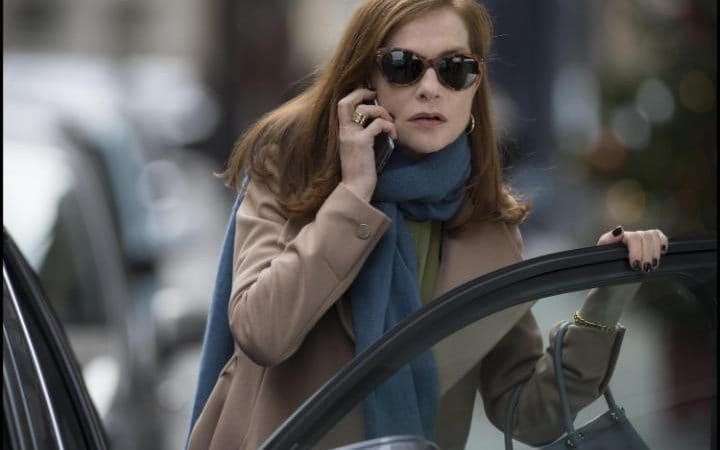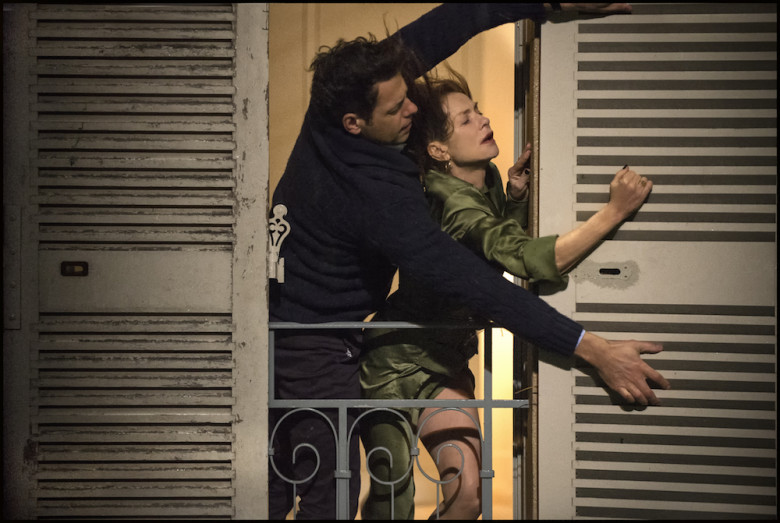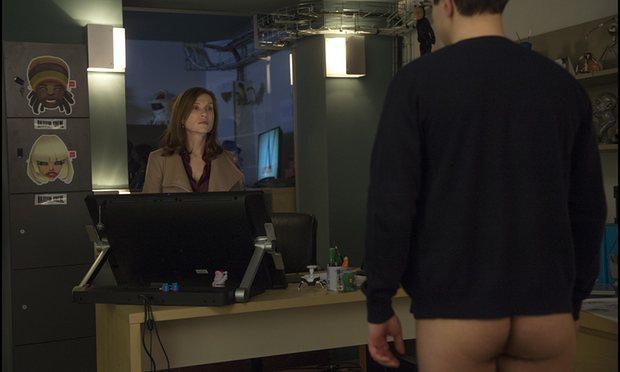
Director: Paul Verhoeven
Genre: Drama
Year: 2016
We open on a cat that has been viewing the rape of her owner from a safe distance. There are countless emotions we could deduct from this animal’s expressive face, but at the end of the day, its ignorance and indifference trump our desire to unravel this feline’s thoughts. The same can be said about much of Paul Verhoeven’s latest film, ELLE, a film that bleeds with poetic subtext and yet embraces apathy with just as much finesse as it does calculated symbolism. Mean is hardly ever a term I’d care to use to describe a film, but with ELLE I’m having a harder and harder time thinking of a more apt adjective.
Subverting tropes is often relegated to the simplest of inversions: a princess saves a prince, a person of color doesn’t die first in a horror film, and so on. But Verhoeven’s approach to subversion comes with a distinct fascination for staunch perversion, a swansong for sickly fantasies. Here we have Isabelle Huppert, putting on what is without a shadow of a doubt the most complex performance of 2016, capturing the emotional fallout of a traumatized little girl who grew up to become a troubled woman in her own right. Verhoeven does everything under the sun with Huppert, analyzing the way she navigates through family, love, friendship, sex, a professional life, and more.

Verhoeven: “No, no, I swear it’s NOT a rape comedy… Hello? Hello?”
It’s all done through a unique writing style that favors the lyrical over the believable. Characters state absurdities and escalate soapy contrivances in order to service Verhoeven’s themes. ELLE is never concerned with playing it safe. This isn’t about making a handful of timely socio-political statements and jumping ship. Verhoeven is far more concerned with having you accept this figure at face value. As such, he lets ELLE boil for a little over two hours, and doesn’t care to over-explain his film’s purpose. I’d be remiss to say that I wish the formal approach would have been as controlled and experimental as the writing, but despite the simplistic, often unimaginative camerawork, ELLE shines as a beacon of unconventional writing.
This really helps ELLE set itself apart in the current landscape of woke cinema. From MOONLIGHT to CERTAIN WOMEN, we’ve had directors of various statures approach timely commentary with the hand-waving, attention-seeking passion of an anxious middle schooler. In the meantime, ELLE remains squarely academic. This is a film that loves to be interpreted, and begs to be discussed. It’s more feminist than NOCTURNAL ANIMALS ever is, and more aware of the complexities of gender politics than any release in 2016. This is true feminist cinema, far more vitriolic and gut-punching than MISS SLOANE dared to be. And I think a core part of its being is the fact that it is quite funny. ELLE manages to pack in so much nihilistic humor despite all of its horrid implications. Somehow you walk out deeply troubled by its whirlwind of emotions rather than the fact that it’s a one-note discussion of rape and victim culture.

I was going to make a “blow me” joke, but I realized that’s pitifully lowest-common denominator
You see, where all of the aforementioned films are clear-cut in their message, ELLE is unnervingly positioned in a grey area. Huppert and her interactions with the men in her life are all so toxic, so unhealthy, and so nihilistic, that the film unfurls with each new modulation. And yet, we understand why she is with these men, for she herself is an unsympathetic protagonist. This comes to a simmer when Huppert lets herself be romantically bandaged by the same man that raped her. It’s only until the halfway point that I began to realize what Verhoeven is really trying to do: This isn’t so much a film about one woman and her attempt to maneuver past waves of masculinity, but rather a film about opportunist women and their capacity to manipulate men so that they can finally be left alone.
Where many might simply see a character study on a fascinating, damaged personality, Verhoeven has dug deeper. This is a discussion of running. Whether it’s running from the truth, running from our aggressors, or running from those we love, Verhoeven is infatuated with the term and all of its modulations. This concept finds a dichotomy with Huppert’s profession at a video game development firm, and her obsession with the experience of her rape that incites the film’s narrative. The live, die, repeat simulation of her rape feels willfully similar to the interactivity of a video game and elegantly ties together with the motif of running. Once Huppert realizes that running is not the answer, she breaks free, finally ready to visit her incarcerated father, forcing him to commit suicide out of sheer distress. Talk about empowerment.

Pictured: POWER
With this cruel, admittedly hard-to-stomach epiphany, Verhoeven completely inverts our understanding of Huppert’s world. She transitions from powerful, but oftentimes uncertain, woman into a force of nature: a bachelorette who can have anything in the world now that she can wind up a man like a clock. Verhoeven can basically be felt giggling through the celluloid at his audience’s discomfort, making love with the sardonic smut and the operatic spectacle that is this this woman’s livelihood. Countless people will falsely read into ELLE as sexist exploitation, but the depth of Huppert’s character negates this. This is an angry film, one that shows no mercy to anyone, regardless of how greatly they are victimized. But at its core, ELLE is a film about women navigating through a universe that disrespects them. And somehow, they come out victorious.
Verdict: Recommend
